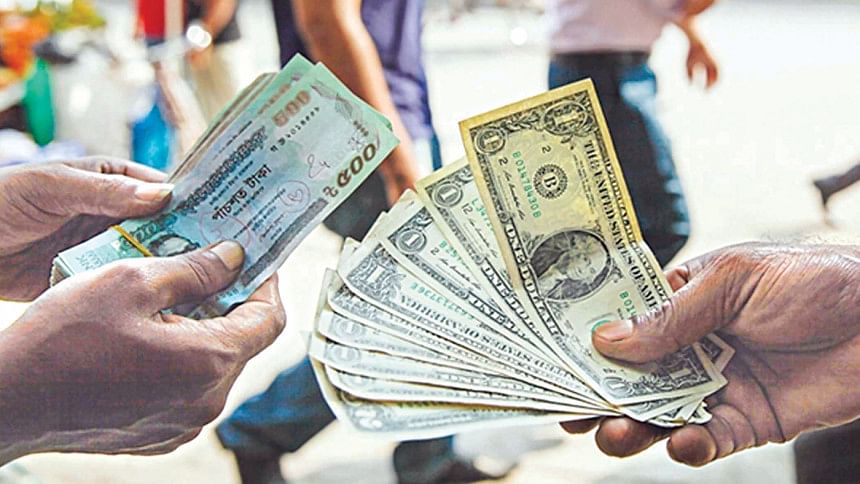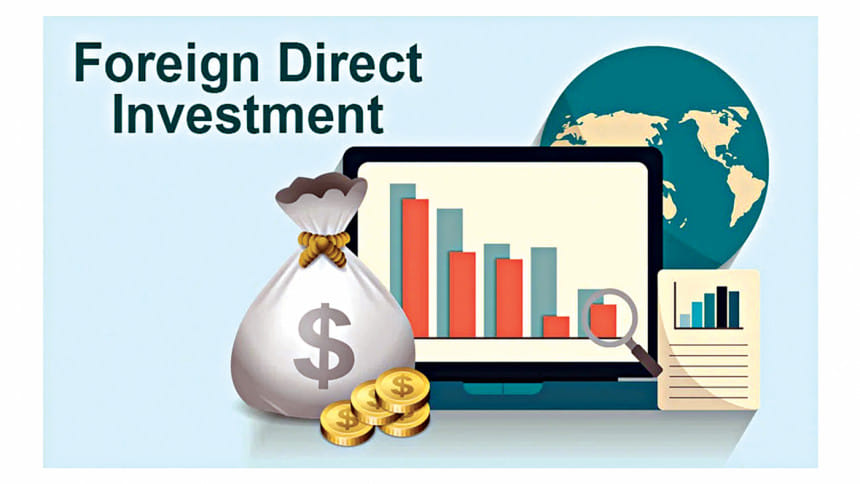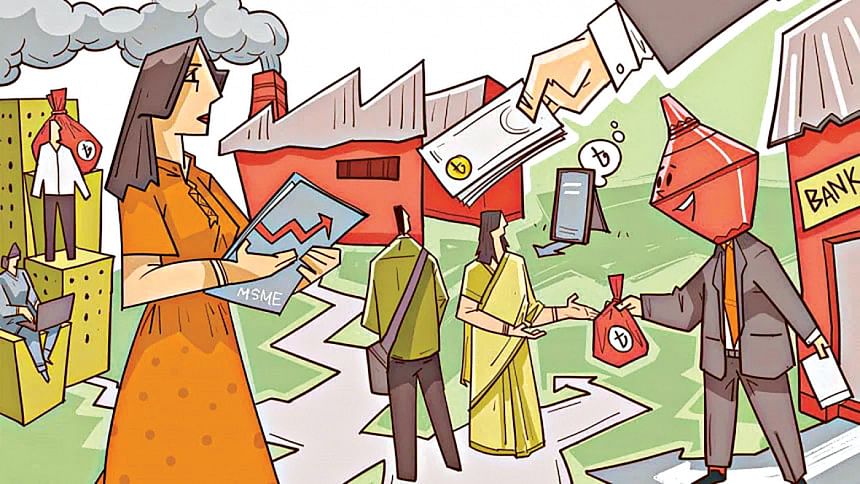How can we become an attractive investment destination?

Economic growth and business development are highly dependent on the business climate created by socio-economic policies and political decisions of governments. Research suggests that countries that provide better public goods and services – such as roads, electricity, gas, water, and sewerage – and offer business-friendly policies that protect the rights of business enterprises, as well as workers, consumers, and the environment, and ensure a stable political system, attracts more investment and businesses. More investment and businesses create more economic activity, which in turn generates more jobs, reduces poverty, and increases social cohesion, and economic growth. Prior to the Covid-19 pandemic in 2020, Bangladesh's economy was growing rapidly, recording an annual expansion in the range of 8 percent.
Just as we started to recover from the fallout of the pandemic, the country started to face unprecedented challenges created by the Russia-Ukraine war. The war has led to a massive increase in energy prices, altered global patterns of trade, production, consumption, and disrupted supply chains which have led to rising prices globally. Rising commodity prices, higher import payments, and low remittance flow resulted in Bangladesh having a negative balance of payments (BoP) in the first five months of the current fiscal year.
The present economic scenario indicates that doing business in Bangladesh may not be all that easy in the coming days. History, however, suggests that tough times like these have only made Bangladesh stronger as a nation. Since independence in 1971, Bangladesh has undergone an amazing transformation in spite of facing periodical floods, cyclones, droughts, and other types of disasters.

When the war-ravaged country gained independence in 1971, the size of its GDP was only USD 6.2 billion. In fiscal year 2021-22 (FY21-22), Bangladesh's GDP grew to USD 465 billion – becoming the 35th biggest economy in the world. A large part of this growth has been driven by export earnings, especially from the ready-made garments (RMG) industry, growth of our agricultural sector, and remittances sent in by our migrant workers.
Bangladesh is, without a doubt, one of the most promising economies in the region. Research, however, shows that to transform Bangladesh into a high-income country, it would need to raise its investment-to-GDP ratio to around 40-44 percent of GDP. Currently the investment-to-GDP ratio in Bangladesh is hovering around 30 percent. Despite steady economic growth over the past decade, investment in Bangladesh has remained comparatively lower than its regional peers. The public investment-to-GDP ratio was 8.67 percent in FY2021, up from 8.41 percent in FY2020, and 8.03 percent in FY2019. Unfortunately, while public investment on the infrastructure front – particularly on megaprojects – has increased, it has been unable to attract significantly higher private investment from either local or overseas sources. The private investment-GDP ratio was 25.25 percent in FY2019, which fell to 20.24 percent the following year, and then rose to 23.70 percent in FY2021, according to BBS data.
We are also lagging behind in attracting foreign direct investment (FDI). While even during the pandemic (2020) FDI flow to developing countries in Asia increased by 4 percent to USD 535 billion, according to figures from the UN Conference on Trade and Development (UNCTAD), Bangladesh could not achieve the expected FDI. According to the latest statistics released by the central bank, in FY2022, Bangladesh received FDI of around USD 3.44 billion and of the amount, USD 2.04 billion accounted for reinvested earnings by the already existing foreign companies in the country. The rest came from equity or fresh investment of USD 1.34 billion. The rate of FDI inflow in Bangladesh is only around 1 percent of GDP, one of the lowest in Asia.

What is worrying is that while Bangladesh is desperately looking for both local and foreign investment, a group of wealthy people are reportedly siphoning huge amounts of money out of the country. According to the Global Financial Integrity (GFI) – a Washington-based think tank – USD 61.6 billion was siphoned out of Bangladesh between 2005 and 2014. In 2015 alone, about USD 5.9 billion was laundered out of the country. GFI also revealed that on an average, USD 7.53 billion has been siphoned out of the country each year and, accordingly, from 2016 to 2020, around USD 37.65 billion has been laundered. The low inflow of FDI, sluggish private investment, and large outflows of capital indicate that we have failed to gain investors' confidence.
Though our government agencies claim they are very keen and sincere about promoting investment, the ground reality often differs from their claim. Industry experts say that there are many gaps in the comprehensiveness of our policies, as well as in their implementation – particularly when it comes to the private sector and investors. Then there is the problem of some areas of business being over-regulated, while others are not regulated enough.
It should be noted that for investors, the level of convenience in doing business in a country plays a crucial role in them investing there. Most, if not all, investors choose to invest in countries based on how easy it is to do business there, as well as by their global business competitiveness. They assess the clarity of existing policies, reliability of government officials, adherence to rules and regulations and, most importantly, whether there is sufficient security for their investments.

In September 2021, the World Bank discontinued publishing its of Ease of Doing Business index. Nevertheless, foreign investors today still evaluate a country's investment potential based on its Ease of Doing Business ranking and overall economic climate. Bangladesh ranked 168 out of 190 countries in 2020, which says a lot about the business environment here. For instance, transferring a property title in Bangladesh takes an average of 271 days, almost six times longer than the global average of 47 days. Resolving a commercial dispute through a local first-instance court takes an average of 1,442 days, almost three times more than the 590 days average among OECD high-income economies. According to the World Bank, it takes 150.2 days for a new business to get electricity connection in Bangladesh, whereas it takes 31 days in Vietnam, 30 days in Singapore, 24 days in Malaysia, and 55 days in neighbouring India.
Furthermore, existing foreign investors often complain about bureaucratic tangles in Bangladesh that stand in the way of business operations and obtaining various licenses. Then there are hidden costs in matters related to procedure, policy, law, and infrastructure that seriously weigh upon the cost of doing business. Such barriers include bureaucratic red-tape, poor socio-economic and physical infrastructure, unreliable energy supply, corruption, absence of good governance, low labour productivity, underdeveloped money and capital markets, high-cost of doing business, complicated tax system, frequent changes in policies on import duties for raw materials, machinery and equipment, delays in decision-making, etc. In recent times, frequent power cuts and a gas crisis have been added to the list of challenges – as a result, industries and businesses in Bangladesh have been struggling since, in many cases, their production declined by 50 percent, while their cost of production rose significantly. Businesses also allege that they have to pay for other hidden costs, for example, to get their goods released from ports, which further pushes up their product prices at the consumers' end.
As unpleasant as it may sound, corruption has spread across every sector in Bangladesh. In the Transparency International's (TI) Corruption Perceptions Index 2021, Bangladesh ranked as the 147th most corrupt country out of 180 countries.
According to the World Economic Forum's (WEF) Global Competitiveness Index (GCI) 2019, Bangladesh slipped two notches to 105 among 141 countries. As per the report, Bangladesh's competitiveness declined in 10 out of 12 categories, where significant deterioration was observed in regards to macroeconomic stability, labour market, ICT adoption, and infrastructure. Beside poor infrastructure, lack of land, acute shortage of power and gas for new industries, finding the right people and getting them to work productively are the biggest problems in Bangladesh today.
Undoubtedly, we have made remarkable progress in expanding primary education, especially in raising the number of student enrolment, and reducing gender disparity. But our education system and curricula do not serve the goal of developing human capital. There is a lack of communication and collaboration between the government, academia, and businesses when it comes to producing quality or skilled individuals for today's modern industries. To cover the shortage, a good number of foreign professionals and technicians are imported from neighbouring countries.
Business insiders say that establishing and running a business in Bangladesh require overcoming numerous challenges. There is no denying that successive governments have taken several reform measures, but more needs to be done to create a congenial business environment to achieve higher economic growth. If our policymakers are serious about improving Bangladesh's position in the global marketplace as an attractive business and investment destination, it has to remove the deterrents discussed above that are responsible for the high cost of investment.

 For all latest news, follow The Daily Star's Google News channel.
For all latest news, follow The Daily Star's Google News channel. 



Comments